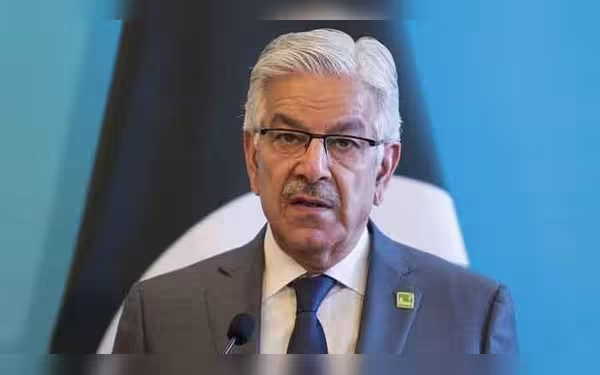Thursday, July 4, 2024 06:05 PM
Khawaja Asif clarifies PM Shehbaz's message to Modi
- Message to Modi was diplomatic formality, not personal admiration
- Criticism towards Imran Khan for supporting banned groups
- Importance of diplomatic protocols for fostering stability in the region
 Image Credits: thenews
Image Credits: thenewsDefence Minister Khawaja Asif clarifies PM Shehbaz's message to Modi as a diplomatic formality. Criticizes Imran Khan for supporting banned groups and emphasizes the importance of diplomatic protocols for regional stability.
Defence Minister Khawaja Asif clarified the recent congratulatory message sent by Prime Minister Shehbaz Sharif to Indian Prime Minister Narendra Modi. Asif stated that the message was a diplomatic formality and did not indicate any personal admiration towards Modi. He reiterated Pakistan's stance on Modi's controversial reputation as a 'murderer of Muslims' based on his actions in India.
Shehbaz Sharif's message to Modi followed the Indian PM's oath-taking ceremony, where Modi received well wishes from various leaders. Former Prime Minister Nawaz Sharif also extended congratulations to Modi, expressing hopes for regional peace and cooperation.
Modi, a member of the BJP, secured his third consecutive term as prime minister through a coalition government. Despite facing challenges in the recent elections, Modi's victory was acknowledged by leaders across borders.
Asif also criticized Pakistani Prime Minister Imran Khan, accusing him of supporting banned groups like the Tehreek-e-Taliban Pakistan. He emphasized the sacrifices made by the Pakistani armed forces and condemned the online defamation of military martyrs.
Addressing rumors of political dialogues between the PML-N government and PTI, Asif highlighted ongoing tensions and conflicting statements from PTI leaders, dismissing any immediate prospects of collaboration.
The exchange of diplomatic messages between Pakistani and Indian leaders has reignited discussions on regional relations and historical tensions. As both countries navigate complex political landscapes, the importance of diplomatic protocols and strategic communication remains crucial for fostering stability and cooperation in the region.













